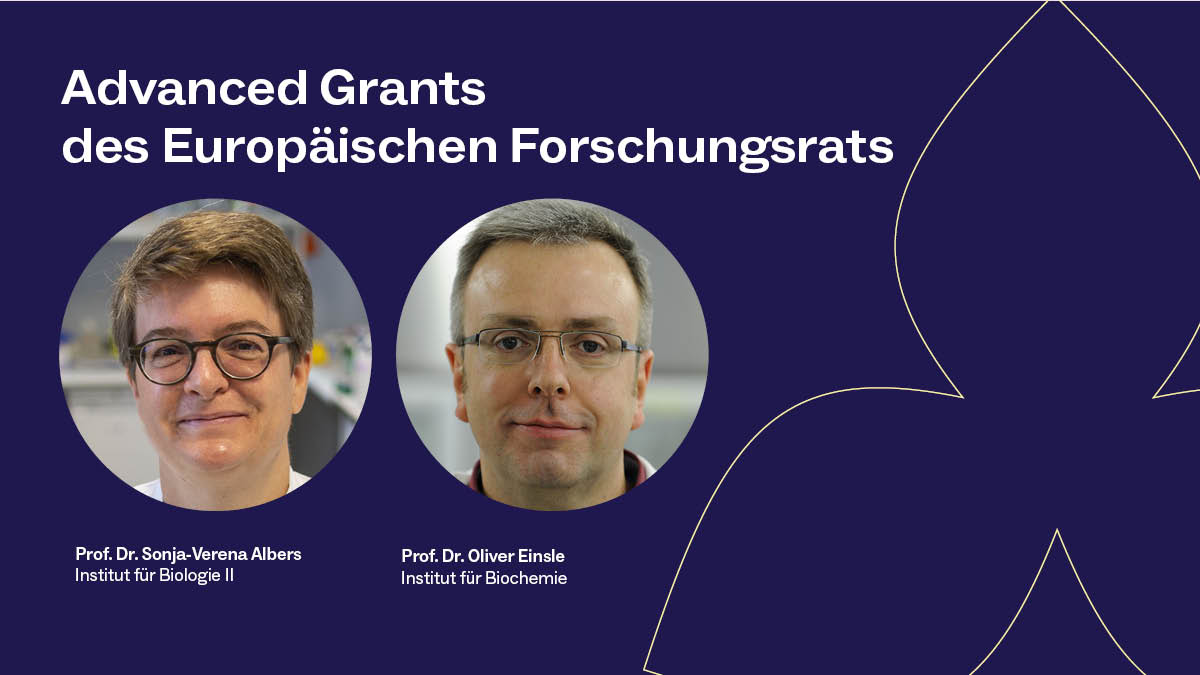Sonja-Verena Albers and Oliver Einsle both receive an ERC Advanced Grant
Freiburg, Apr 11, 2024

Prof. Dr. Sonja-Verena Albers, Prof. Dr. Oliver Einsle. Photos: Patrick Seeger, Graphic: Universität Freiburg
The European Research Council (ERC) will fund microbiologist Prof. Dr Sonja-Verena Albers and biochemist Prof. Dr Oliver Einsle over five years as part of an ERC Advanced Grant with two and a half and around three million euros respectively: Albers specialises in archaea and is developing model systems in order to be able to observe these single-celled organisms at a molecular level. Einsle is investigating how plants can fix nitrogen with the help of enzymes, thereby seeking a natural alternative to the industrial Haber-Bosch process.
New protein for the cell division of one domain of life
Alongside bacteria and eukaryotes (organisms with a cell nucleus), archaea form one of the three domains of life. Albers and her team are investigating how the cell division of these microorganisms works and what role proteins play in this process in the ARCHCELLORG - Organisation of the Archaeal Cell project, for which the microbiologist has been awarded her ERC Advanced Grant. For a long time, it was difficult to conduct cell biology work in archaea. In recent years, scientists have succeeded in developing more and more tools that make this possible. Albers will use these to investigate important processes such as cell division and the organisation of the archaeal cell. “Recently, we were able to show that completely unexpected proteins play an essential role in archaeal cell division. These findings open up new avenues in cell biology so that we can methodically catch up with bacteria and eukaryotes in the field of archaea,” explains Albers.
Future prospects: crops that produce their own nutrients
“Legumes such as peas and beans are currently the only crops that can fix nitrogen from the atmosphere and thus make this nutrient available to themselves,"”says Einsle. “In order to be able to transfer this ability to other plants in future, my interdisciplinary team and I are working on optimising enzymes at the molecular level so that they can also function in other organisms.” The scientists are pooling their research in the Harnessing the Catalytic Potential of Nitrogenases - GOFIXIT project, which is now being funded with an ERC Advanced Grant. It describes a two-prong approach: Firstly, there are experiments with non-nitrogen-fixing bacteria, which should provide information about the basic metabolic pathway. As soon as these bacteria are able to fix nitrogen, the researchers want to start transferring the procedure to yeast cultures, which will serve as model systems for eukaryotes.
- In 2014 Sonja-Verena Albers accepted a professorship at the Faculty of Biology at the University of Freiburg. Her research focuses on the assembly and function of the archaeal motility structure (archaellum), the mechanisms of cell division in archaea and the function of cyclic nucleotides in archaea. In 2012, the microbiologist received an ERC Starting Grant. This was followed in 2019 by a Momentum grant from the Volkswagen Foundation, which Albers used to realise the preliminary work for the ERC Advanced Grant. Albers is Dean at the Faculty of Biology and a member of the Cluster of Excellence CIBSS - Centre for Integrative Biological Signalling Studies and the Centre for Biological Signalling Studies (BIOSS) at the University of Freiburg. She was elected a Fellow of the American Society for Microbiology (ASM) in 2023 and has been a member of Leopoldina since 2022.
- Oliver Einsle has been a full professor of Biochemistry and Director at the Institute of Biochemistry at the Faculty of Chemistry and Pharmacy at the University of Freiburg since 2008. The scientist analyses the structure, function and biogenesis of complex enzyme systems - with a focus on the enzymatic activation of small molecules such as nitrogen, nitrous oxide or carbon monoxide. In 2012, the ERC supported the work of Einsle, who is a member of the Centre for Biological Signalling Studies (BIOSS) at the University of Freiburg and the German National Academy of Sciences (Leopoldina), with a Starting Grant.
Contact
Office of University and Science Communications
University of Freiburg
Tel.: 0761/203-4302
kommunikation@zv.uni-freiburg.de

